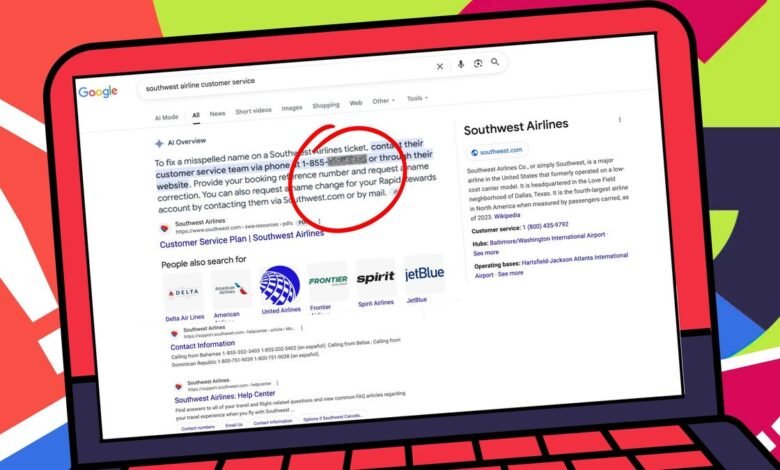Beware: How to Spot Scammers in Google’s AI Responses

▼ Summary
– Scammers are using AI tools like Google’s AI Overview and ChatGPT to insert fake customer service numbers into search results.
– Victims have been tricked into calling these numbers and providing payment information, assuming the results were legitimate.
– The problem is exacerbated because AI often presents a single result, increasing the likelihood users will trust and follow it.
– Both Google and OpenAI acknowledge the issue and state they are taking action to remove fake numbers and improve their systems.
– To avoid scams, users should use traditional search methods or go directly to a company’s website for contact information.
When searching for customer service numbers online, many people now turn to AI-powered tools for quick answers. This convenience, however, comes with significant risks, as scammers have found ways to manipulate these systems to display fraudulent contact details. Instead of relying solely on AI-generated results, it’s safer to verify information through official company websites or traditional search methods.
Several individuals have recently shared stories of falling victim to scams after using Google’s AI Overview or AI Mode to find customer support numbers. Believing the numbers provided were legitimate, they called and shared payment information, only to discover later that they had been dealing with criminals.
One such case involved a real estate CEO who searched for Royal Caribbean’s customer service number. The number he found seemed authentic, and the person on the other end used correct pricing and service terminology, making the interaction feel genuine. It was only after unauthorized charges appeared on his credit card that he realized he had been tricked.
In another instance, a person trying to reach Swiggy Instamart’s support called a number from Google’s AI results. The “agent” asked for their WhatsApp number, called them back, and instructed them to share their screen, a major red flag. The user became suspicious and ended the call. It turned out Swiggy doesn’t even offer phone support, only chat-based assistance.
Scammers have long used search engine manipulation to post fake contact information, but AI tools amplify the danger. Traditional searches return multiple results, allowing users to cross-reference sources. AI summaries, by contrast, often present a single answer, increasing the likelihood that users will trust and use fraudulent details without question.
This issue isn’t unique to Google. OpenAI’s ChatGPT has also been exploited in similar ways, with hackers using prompt injection to insert scam messages and fake numbers into AI responses.
Google has stated that it has taken action against several fake numbers and is continuously improving its systems to prevent such scams. OpenAI also acknowledged that many fraudulent pages have been removed, though these updates can take time to fully implement.
To protect yourself, avoid blindly trusting phone numbers or contact details provided by AI. Instead, perform a standard search or go directly to the company’s official website to find verified information. You can also disable AI Overviews in Google Search by adding “–AI” to your query.
Additional precautions include checking URLs before clicking, using the “About this result” feature to learn more about a source, and watching for warning signs like odd formatting or unexpected characters on websites. Remember, not all businesses provide phone support, if you can’t find a number on their official site, be extra cautious of any numbers that appear in search results.
For business owners, clearly highlighting official customer support channels on your website can help customers avoid falling prey to these sophisticated scams.
(Source: ZDNET)





